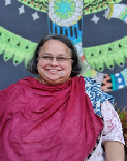Swati Dyahadroy is working at the Women's Studies Center at Savitribai Phule Pune University for the last 20 years. Her research interests include the politics of development and critical understanding of the politics of nation in the post 90s period with reference to emergence of globalization and right-wing politics. She is passionate about developing women's studies as a critical field of inquiry, focusing on caste, gender and community politics. She also believes that the challenges posed before the sector of higher education in contemporary India can be better addressed by Women's Studies. She has been involved in curriculum building and setting up institutional practices at the centre and in a wider dialogue with the different worlds of Women's Studies for more than two decades. For the last ten years or so, she has been actively involved with developing and implementing research projects which were making interventions in higher education, especially in how gender and caste are playing important roles in shaping the space of higher education. She was part of research projects such as ‘Developing Research and Teaching Capacity in Women’s/Gender Studies: Integrating Equality and Quality’ which mapped curriculum and pedagogic practices in different women’s studies centres. Further, she was part of another research project which mapped diversity and inclusion/exclusion in the space of higher education using a campus climate survey method titled, ‘Inclusive Universities: Linking Equity, Diversity and Excellence for the 21st Century’, supported under US-Indo Initiative during 2013-2017 in collaboration with University of Massachusetts, Amherst. Swati is continuously engaged with the issue of inclusion/exclusion of women/men from the marginalized communities, especially their experience of the site/curriculum, etc. She is also actively involved in building teaching/learning resources for women’s studies both in English and Marathi (regional language) and also active in reflecting upon what changes need to be made in the curriculum in order to make it more accessible and contemporary.

Swati Dyahadroy.
Department of Women and Gender Studies,Savitribai Phule Pune University.
